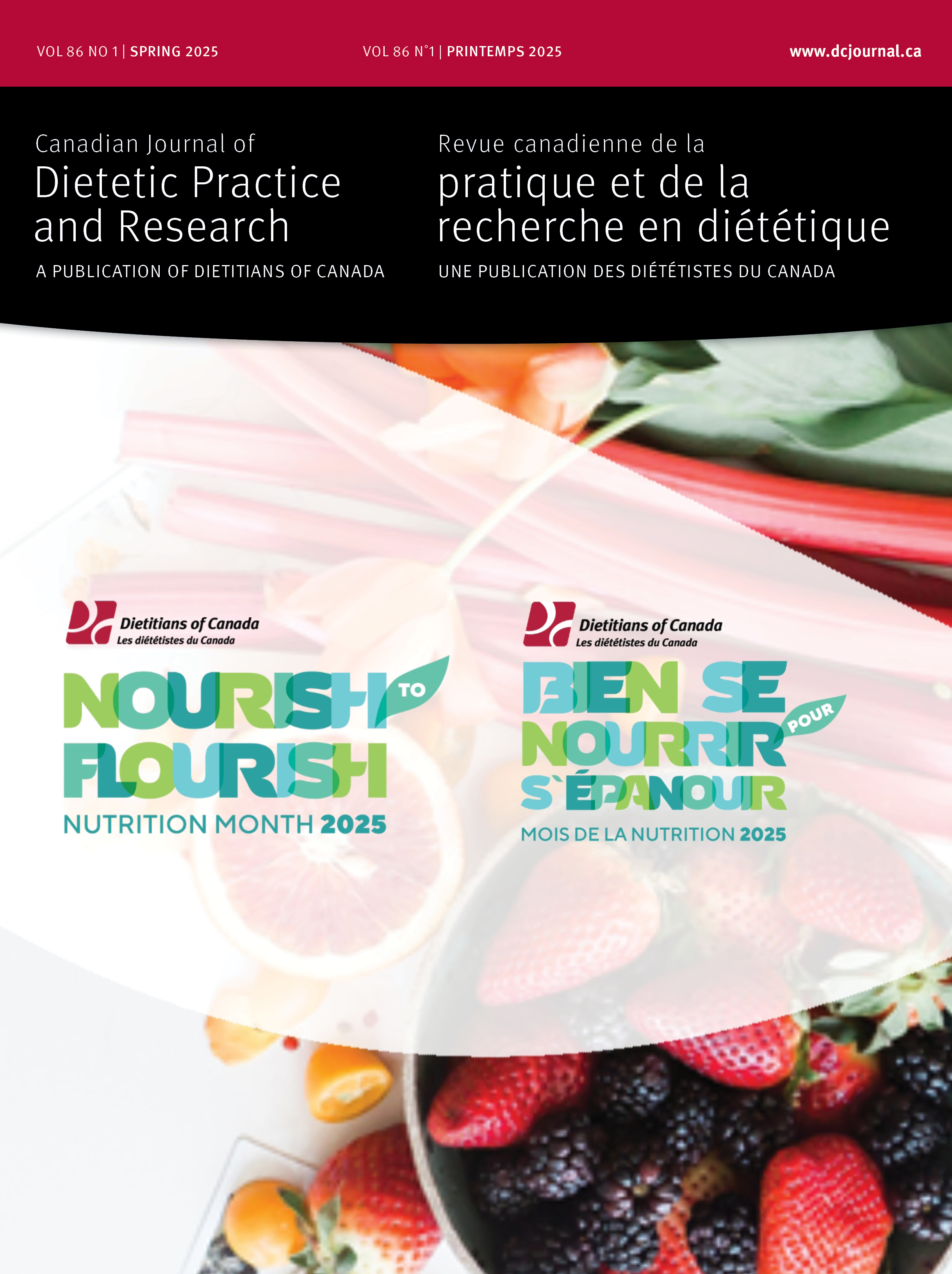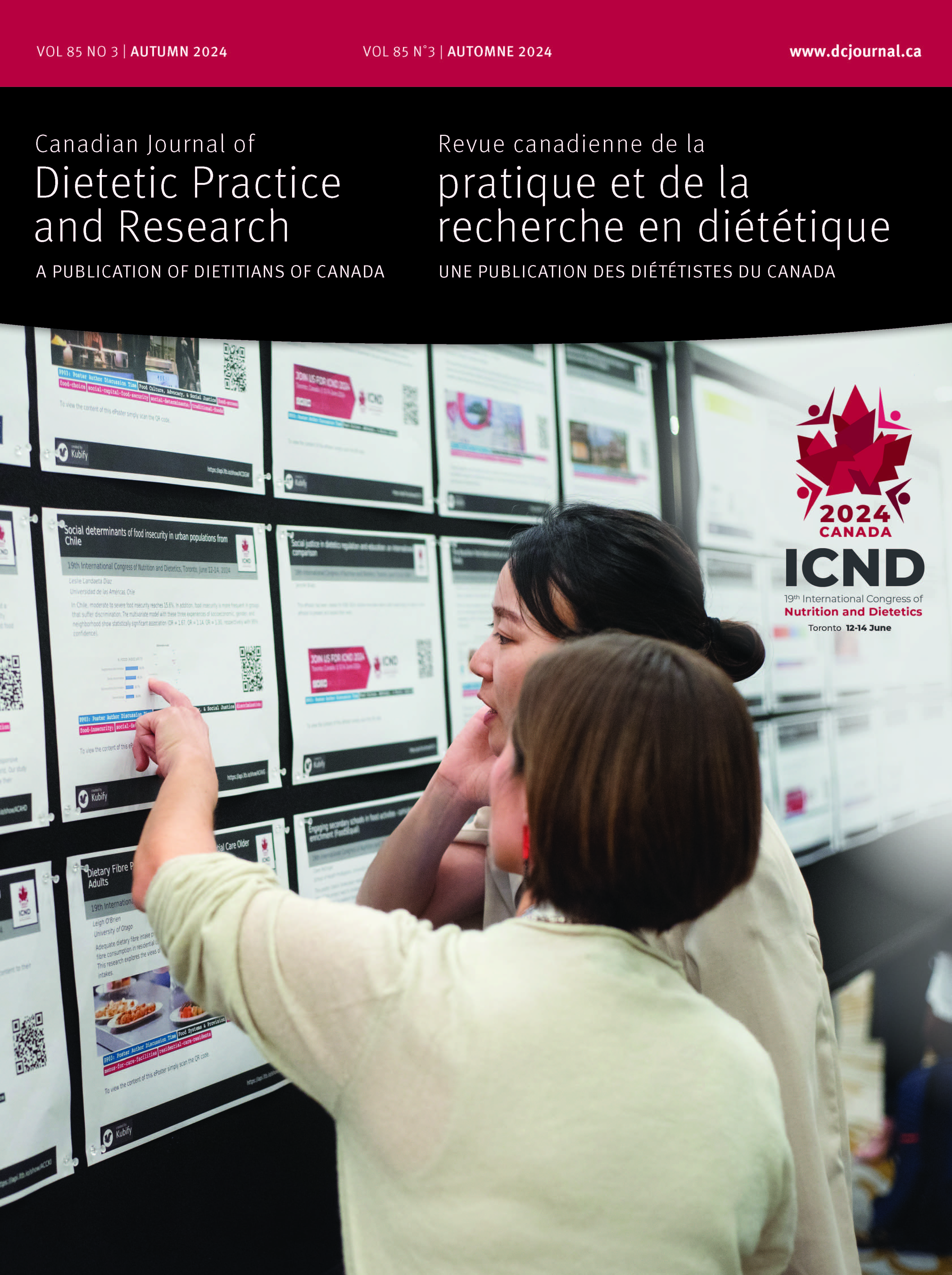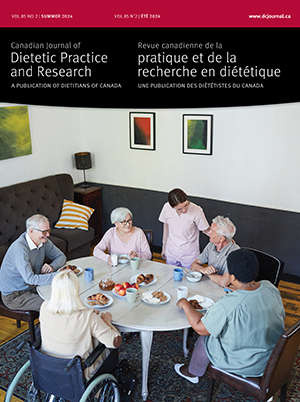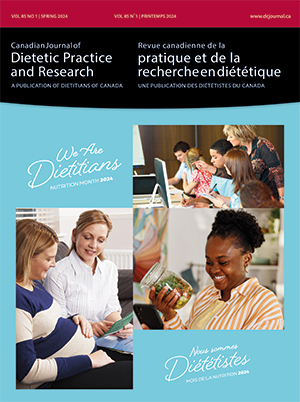Volume 83 • Number 3 • September 2022
Editor’s Message
Research
OPEN ACCESS
Purpose: To estimate the percentage of a sample of pregnant women in Canada following a vegetarian, vegan, low-carbohydrate, gluten-free, Mediterranean, or well-balanced diet, before and during pregnancy and to explore if pregnant women received and were satisfied with nutrition information received from health care providers (HCPs).Methods: Participants were conveniently sampled through Facebook and Twitter. An online survey collected data on sociodemographic characteristics, maternal diet, and whether women received and were satisfied with nutrition information from their HCPs. The McNemar test assessed changes in the proportion of diets followed before and during pregnancy.Results: Of 226 women, most followed a well-balanced diet before (76.9%) and during (72.9%) pregnancy (p = 0.26). Vegetarian, gluten-free, vegan, and low-carbohydrate diets were the least followed diets before and during pregnancy (vegetarian: 7.6% vs 5.3%; gluten-free: 4.9% vs 4.0%; vegan: 2.7% vs 2.2%; low-carbohydrate:4.0% vs 0.4%). Overall, the number of women following restrictive diets before pregnancy was significantly reduced throughout pregnancy (19.1% vs 12.0%, p < 0.001). Only 52.0% of women received nutrition information from their primary HCP, and 35.6% were satisfied with the nutrition information received.Conclusions: Most women followed a well-balanced diet before and during pregnancy and approximately one-third were satisfied with the information received from HCPs.
Purpose: Our aim was to explore Canadian dietitians’ knowledge, beliefs, and values relating to the nutritional care of Two-Spirit, lesbian, gay, bisexual, trans, and other queer groups (2SLGBTQ+).Methods: The research was qualitative and used a poststructural theoretical lens. Interviews were conducted with 16 Canadian dietitians. Data were analyzed using thematic analysis.Results: Three themes were noted: (i) moving away from the binary; (ii) systemic discrimination and 2SLGBTQ+ experiences; and (iii) professional organizations and advocacy. The participants discussed structural, professional, and cultural barriers that affect the nutrition and health experiences of sexual and gender diverse groups.Conclusion: Dietetic institutions and regulatory bodies must provide sexual and gender diversity resources and engage in activities that acknowledge the lives and nutritional concerns of sexual and gender diverse people. Such advocacy is a means to provide more inclusive and equitable care. Key recommendations for structural changes within the profession include using an intersectional lens and a critical dietetic approach to nutritional care.
Purpose: The healthcare sector is an important area for sustainable food initiatives, given its inherent mission to heal and its substantial impact on the food system. Foodservice managers can take part in these initiatives by using sustainable menu practices (SMPs). This study aimed to explore managerial perceptions of barriers and facilitators to adopting SMPs in Québec healthcare institutions.Methods: Seventeen foodservice managers were recruited through purposeful sampling to participate in a qualitative semi-structured interview. The Diffusion of Innovations theory was used to assess the main determinants of the diffusion of an innovation (SMPs) through a complex social system (healthcare organization).Results: Participants reported more barriers than facilitators. Lack of support at many levels was recognized as a major hindrance to SMP adoption, as were shortfalls in political directives. Increased collaboration between all food system actors and better communication in healthcare were perceived as needed for increased SMP adoption.Conclusions: This research contributes to an in-depth understanding of managerial experiences in SMP adoption in various regional and healthcare settings. Findings suggest the need for support and strategies that would remove important barriers for foodservice managers and contributed to the development of a guide to support foodservice managers in implementing SMPs.
Perspectives in practice
Comprehensive school-based nutrition interventions offer a promising strategy to support healthy eating for First Nations children. A targeted strategic review was performed to identify nutrition interventions in 514 First Nation-operated schools across Canada through their websites. Directed content analysis was used to describe if interventions used 1 or more of the 4 components of the Comprehensive School Health (CSH) framework. Sixty schools had interventions. Nearly all (n = 56, 93%) schools offered breakfast, snack, and (or) lunch programs (social and physical environment). About one-third provided opportunities for students to learn about traditional healthy Indigenous foods and food procurement methods (n = 18, 30%) (teaching and learning) or facilitated connections between the school and students’ families or the community (n = 16, 27%) (partnerships and services). Few schools (n = 10, 17%) had a nutrition policy outlining permitted foods (school policy). Less than 1% (n = 3) of interventions included all 4 CSH components. Results suggest that most First Nation-operated schools provide children with food, but few have nutrition interventions that include multiple CSH components. First Nation-operated schools may require additional financial and (or) logistical support to implement comprehensive school-based nutrition interventions, which have greater potential to support long-term health outcomes for children than single approaches.
The purpose of this study was to evaluate nutrition knowledge and diet quality in collegiate athletes to determine if referral to a sports registered dietitian (RD) is warranted. This cross-sectional study analyzed four sections of the Nutrition for Sport Knowledge Questionnaire and the Rapid Eating Assessment for Patients Questionnaire, both validated in athletic populations. The relationship between nutrition knowledge and diet quality was evaluated. Significance was set at P ≤ 0.05. One hundred and twenty athletes reported a median nutrition score of 52 (45–61), and a dietary quality score of 53 (46–58), with a weak, positive association between both (r = 0.28 (95% CI: 0.11–0.44), P < 0.01). Fifty-four percent were categorized as needing a referral to a sports RD. Diet quality scores differed between dietitian referral group with 49 (43–54) versus 58 (52–62) for the nonreferral group, respectively (P < 0.01, V = 0.71), with no difference in nutrition knowledge observed, P = 0.73. Overall, nutrition knowledge and diet quality in our sample of collegiate athletes was poor. College athletic departments with limited access to sports RD should use these questionnaires to evaluate knowledge and the need of dietitian referral separately.
In nursing and medicine, taking part in simulation activities has been shown to be beneficial for students’ learning; however, little has been documented in dietetics. This study aimed to document the perceived effect of 4 simulations on development of professional competencies by dietetic students. A mixed-method convergent approach was used with pre- and post-questionnaires, interviews, and a focus group discussion to look at dietetic students’ perceptions of learning as part of a Nutrition Assessment course. Nonparametric tests for questionnaires and theme analysis for transcripts were used to examine data. After analysis, data were compared and merged for interpretation. Results showed that participants perceived a significant increase in comprehension of various competencies with simulations. In interviews and a focus group, a participant subgroup (n = 7) perceived an enriched understanding of some dietetic competencies compared with pre-simulations. Simulations seemed to have transformed classroom concepts to a more practical understanding of dietetic practice. More studies are needed to identify if these results could be replicated in different settings. Simulations had a positive effect on students’ perception of competencies development and may be an andragogical tool of choice to support preparing future dietitians for entry to practice.
Report
Purpose: A pilot study to investigate the impact of the COVID-19 pandemic and shift to online learning and practicum training on dietetics students’ perceptions of Partnership for Dietetic Education and Practice (PDEP) competency acquisition and mental health.Methods: Dietetics students (n = 19) at the University of Guelph (2020–2021) were invited to complete an anonymous online survey to assess self-reported online dietetics practicum training experiences including (i) benefits and challenges, (ii) PDEP competency acquisition, and (iii) impact on mental health.Results: The benefits of online dietetics training included schedule flexibility (42.1%), reduced commute time (31.6%), and acquiring virtual counselling experience (21.1%). Reported challenges were insufficient communication with preceptors (36.8%), increased project workload (57.9%), and technology (15.8%). In online practicum placements, 52.6% of dietetics students reported adequately acquiring all PDEP competencies, with Nutrition Care identified as the most challenging to obtain (63.2%). A negative impact on mental health and increased levels of stress/anxiety were reported in 94.7% of trainees. Notably, 63.2% of students favoured continuation of online dietetics training through a hybrid or entirely online format.Conclusion: Online dietetics training has the potential to complement the traditional in-person model; however, further adaptation is required to optimize PDEP competency acquisition and students’ mental health.
Purpose: To compare nutrition and health outcomes before and after implementing a standardized enteral feeding protocol on nutrition and health outcomes in very low birth weight preterm infants.Methods: A retrospective chart review was performed evaluating preterm infants, born less than 34 weeks gestation and weighing less than 1500 g, before and after the implementation of a standardized enteral feeding protocol. Outcomes included weaning of parenteral nutrition, initiation and advancement of enteral feeds, initiation of human-milk fortifier (HMF), change in weight z-score and neonatal morbidities.Results: Fifty-six infants (30 in pre-group, 26 in post-group) met the inclusion criteria. Infants in the standardized enteral feeding protocol group started enteral feeds earlier (p = 0.039) and received full HMF fortification at lower weights (p = 0.033) than those in the pre-group. Fewer days on continuous positive airway pressure (p = 0.021) and lower rates of bronchopulmonary dysplasia (p = 0.018) were also observed in the post-group. Weaning of parenteral nutrition and weight z-score were not significantly different between groups. There were no differences in other morbidities.Conclusion: Study results suggest that adopting a standardized enteral feeding protocol may promote early initiation of enteral feeds and fortification.










